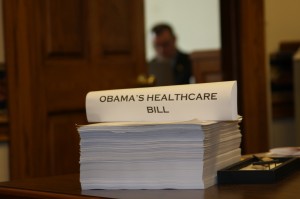July 23, 2012
 Doctors often recommend blood tests to help them diagnose our condition or to check our health status. For example, I have an underactive thyroid condition. As discussed in my book ‘Talking about health’ — my ‘normal’ numbers fall outside the range of a healthy ‘normal’ [see for a discussion http://www.denvernaturopathic.com/news/TSH.html]. I was diagnosed with this condition in my 20s and have taken daily medication to address it since that time. My mother was diagnosed with the condition in her 20s as well. I go to see my internist annually, and he puts in an order for a TSH [thyroid stimulating hormone] test [http://www.endocrinology-online.com/Content/For%20Patients/TSH.htm] that I go to the lab for several weeks before my scheduled appointment. This test is considered to be very sensitive–but what does that mean? It is the probability that a person having a disease will be correctly identified by a clinical test. However, a careful reading of the article at the link shows that the results may depend on the time off day you were tested–a reason why the test is given in the morning after fasting.
Doctors often recommend blood tests to help them diagnose our condition or to check our health status. For example, I have an underactive thyroid condition. As discussed in my book ‘Talking about health’ — my ‘normal’ numbers fall outside the range of a healthy ‘normal’ [see for a discussion http://www.denvernaturopathic.com/news/TSH.html]. I was diagnosed with this condition in my 20s and have taken daily medication to address it since that time. My mother was diagnosed with the condition in her 20s as well. I go to see my internist annually, and he puts in an order for a TSH [thyroid stimulating hormone] test [http://www.endocrinology-online.com/Content/For%20Patients/TSH.htm] that I go to the lab for several weeks before my scheduled appointment. This test is considered to be very sensitive–but what does that mean? It is the probability that a person having a disease will be correctly identified by a clinical test. However, a careful reading of the article at the link shows that the results may depend on the time off day you were tested–a reason why the test is given in the morning after fasting.
But aren’t all medical tests highly sensitive? Otherwise, why do them?
The answer to the latter is ‘because that is the best that can be done’. The answer to former is ‘no’.
Take the CA 125 test, for example. The test was hoped to be a valid indicator of ovarian cancer. However, the test indicates the presence of other disease as well. So a positive CA 125 test validly indicates the presence of ovarian cancer sometimes but often does not:
“The result of a Ca-125 test is interpretable only by considering the context in which it was ordered. When you order a Ca-125 test you will have to estimate your patient’s risk for having ovarian cancer. If your patient can be put in a group in which the likelihood of cancer is high then a positive test is probably correct and a negative test wrong. If your patient can be placed in a low risk group then the positive test is probably wrong and the negative test meaningless. Furthermore, there is no way to evaluate a positive test. You can repeat the test and pick the best 2 out of 3; 3 out of 5; 4 out of 7, etc. Otherwise, she will be heading for surgery” [http://www.gynoncology.com/ca-125/].
So if your doctor orders a CA 125 test, remember that the results should be discussed. This is true of all medical tests.But when a test that has been ordered is not highly sensitive, it is really important to discuss the meaing of the test result. If the test comes back positive and is not highly sensitive, have a conversation and ask: ‘What’s next to rule in or rule out the condition you were testing for?’ AND ‘What other conditions could the positive test result suggest I may have? How will we rule out whether I do or do not have them?’





